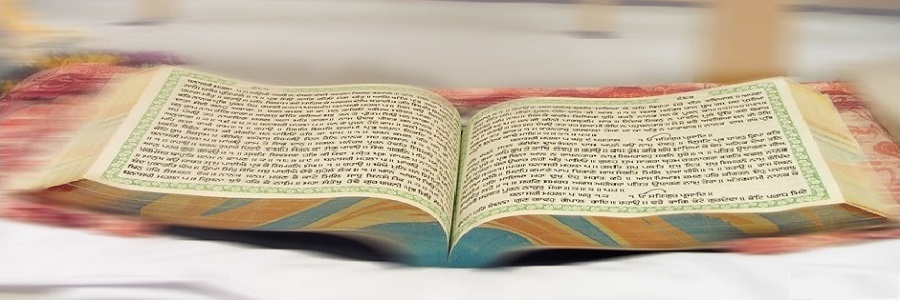
Sikh Bhagats (Holy People)
The Sikh Bhagats (Gurmukhi: ਭਗਤ) refer to holy men who lead a life of spirituality, dedication to God and whose teachings are included in the Sri Guru Granth Sahib. They lived between the 12th and 15th centuries.
Throughout the history of India there have been people and thinkers who were dissatisfied with the superstitions and the thousands of the religious vagaries of Hinduism. They gradually evolved a belief in one God and preceded Guru Nanak as does the dawn before sunrise.
The teachings of these Bhagats, whose words and teachings were included in the Holy Granth by Guru Arjan Sahib Ji are given the same prominence in the Sri Guru Granth Sahib, the Sikh holy book, as the teachings of the ten Sikh Gurus. Guru Arjan Sahib Ji selected the writings of both Hindus and Muslims with equal impartiality, according to their suitability of his purpose and religious reformation that was Sikhism.
The word "Bhagat" means someone who is an extremely pious holy person, leads humanity towards God and highlights injustices in the practices of the world.
There are 15 Bhagats who are given respect in the Guru Granth Sahib as the Bani of the Ten Sikh Gurus.
Below is the list of these Bhagats included in Sri Guru Granth Sahib (SGGS):
 Bhagat Beni Ji - has 3 hymns in SGGS.
Bhagat Beni Ji - has 3 hymns in SGGS.
 Bhagat Bhikhan Ji - was a sufi from Uttar Pradesh and has 2 hymns in SGGS.
Bhagat Bhikhan Ji - was a sufi from Uttar Pradesh and has 2 hymns in SGGS.
 Bhagat Dhanna Ji - was a cultivator from Rajasthan and has 4 hymns in SGGS.
Bhagat Dhanna Ji - was a cultivator from Rajasthan and has 4 hymns in SGGS.
 Bhagat Farid Ji - was a muslim from Punjab and has 134 hymns in SGGS.
Bhagat Farid Ji - was a muslim from Punjab and has 134 hymns in SGGS.
 Bhagat Jaidev Ji - was a poet from Bengal and has 2 hymns in SGGS.
Bhagat Jaidev Ji - was a poet from Bengal and has 2 hymns in SGGS.
 Bhagat Kabir Ji - was a weaver and has 292 hymns in SGGS.
Bhagat Kabir Ji - was a weaver and has 292 hymns in SGGS.
 Bhagat Namdev Ji - was a calico printer from Maharashtra and has 60 hymns in SGGS.
Bhagat Namdev Ji - was a calico printer from Maharashtra and has 60 hymns in SGGS.
 Bhagat Parmanand Ji - was from Maharashtra and has 1 hymn in SGGS.
Bhagat Parmanand Ji - was from Maharashtra and has 1 hymn in SGGS.
 Bhagat Pipa Ji - was a king from Uttar Pradesh and has 1 hymn in SGGS.
Bhagat Pipa Ji - was a king from Uttar Pradesh and has 1 hymn in SGGS.
 Bhagat Ramanand Ji - was from Uttar Pradesh and has 1 hymns in SGGS.
Bhagat Ramanand Ji - was from Uttar Pradesh and has 1 hymns in SGGS.
 Bhagat Ravidas Ji - was a shoe maker from Uttar Pradesh and has 41 hymns in SGGS.
Bhagat Ravidas Ji - was a shoe maker from Uttar Pradesh and has 41 hymns in SGGS.
 Bhagat Sadhna Ji - was a butcher from Sindh and has 1 hymns in SGGS.
Bhagat Sadhna Ji - was a butcher from Sindh and has 1 hymns in SGGS.
 Bhagat Sain Ji - was a barber from Uttar Pradesh and has 1 hymn in SGGS.
Bhagat Sain Ji - was a barber from Uttar Pradesh and has 1 hymn in SGGS.
 Bhagat Surdas Ji - was a blind poet and has 2 hymns in SGGS.
Bhagat Surdas Ji - was a blind poet and has 2 hymns in SGGS.
 Bhagat Trilochan Ji - was a brahmin from Maharashtra and has 4 hymns in SGGS.
Bhagat Trilochan Ji - was a brahmin from Maharashtra and has 4 hymns in SGGS.
Most of the Hindu Bhagats began life as worshippers of idols, but by study and contemplation arrived at a system of monotheism which was appreciated by Guru Arjan. The Muhammadan Bhagats lived in Hindu centres and became largely imbued with Hindu modes of thought, while they at the same time retained their traditional belief in the Divine entity.
Though the spirituality of the Bhagats and certain biographical details are mentioned in both the Sri Guru Granth Sahib and Bhai Gurdas ji's Vars, there are no detailed 'Sikh' accounts (compared to those on the lives of the Gurus) of these Bhagats, but accounts of the Bhagats lives are contained in the writings of Nabhaji (the Bhagat Mal), Uddava Chidghan, Mahipati (the Bhakta Lilamirita), Ganesh Dattatre, Maharaja Raghuraj Sinha, Dahyabhai Ghelabhi Pandit, and others in various Indian languages.
In one recension of Bhai Banno's Granth, preserved at Mangat in the Gujarat district of the Punjab, there is included a hymn composed by Mira Bai, Queen of Chitaur. It is believed that Guru Arjan did not give it a place in his collection because the lady lived and died an idolater.



